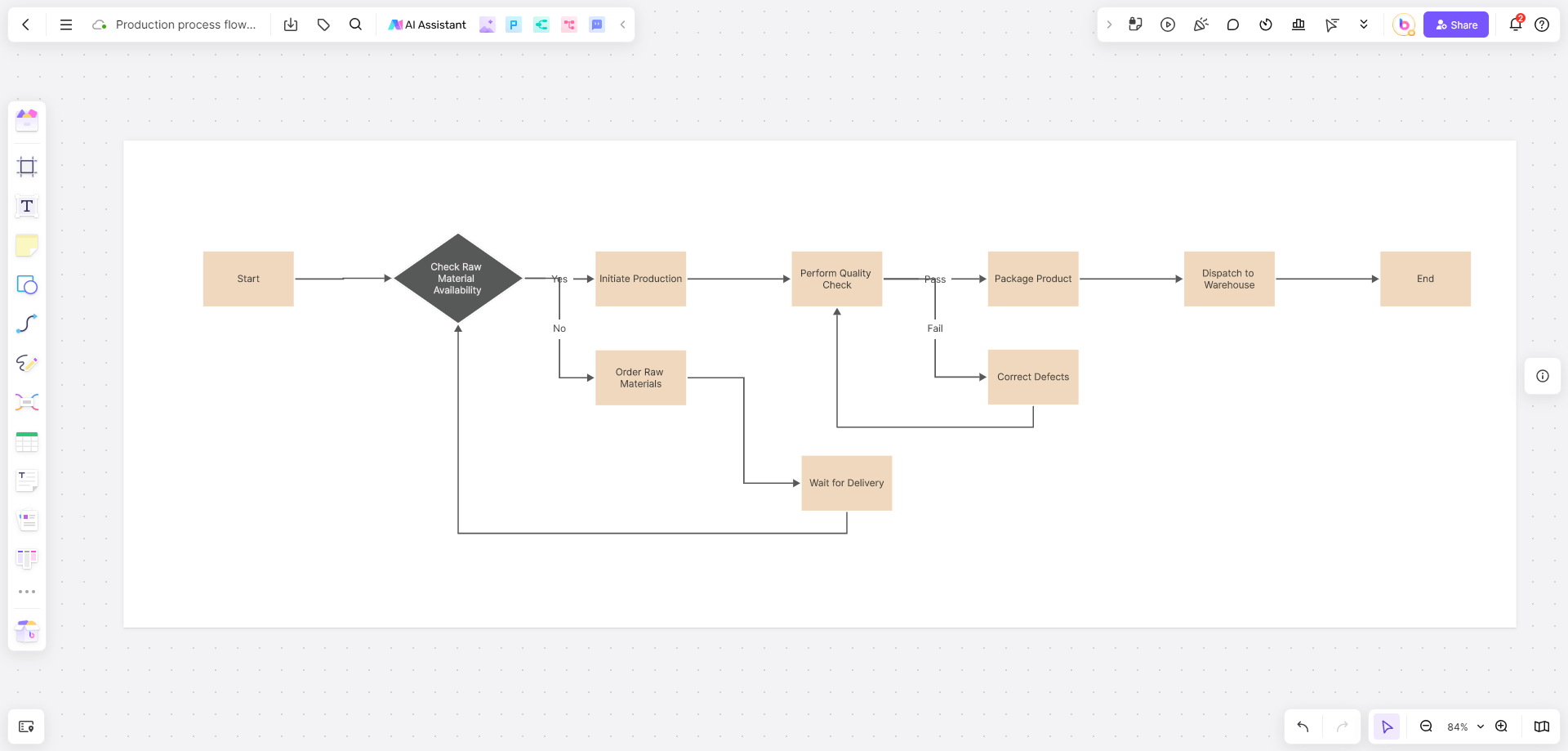Setting clear, actionable, and achievable goals is crucial for success in any profession, and nursing is no exception. SMART goals, an acronym that stands for Specific, Measurable, Achievable, Relevant, and Time-bound, provide a structured approach to goal setting that can significantly enhance professional development. In this comprehensive guide, we will explore what makes up a SMART goal, how SMART goals can improve your nursing practice, and provide specific smart nursing goals examples tailored to various levels of nursing experience. By integrating nursing SMART goals examples, you will be equipped with the knowledge and tools to advance your career effectively.
What Makes Up a SMART Goal?

To understand how to create effective SMART goals, it's essential to break down each component:
Specific: A goal should be clear and specific, answering the who, what, where, and why. For example, instead of saying, "I want to improve my nursing skills," a specific goal would be, "I want to complete a certification course in pediatric nursing to improve my skills in child care."
Measurable: A goal should have criteria for measuring progress. This could involve quantifiable milestones or indicators of progress. For instance, "I will complete 20 hours of continuing education in pediatric nursing within the next three months."
Achievable: While goals should be challenging, they must also be realistic and attainable. Setting an achievable goal requires considering your current skills, resources, and constraints. For example, "I will attend two pediatric nursing workshops this quarter."
Relevant: Goals should align with your broader professional objectives. Ensure that each goal is pertinent to your career path. For example, improving pediatric nursing skills is relevant if you work in a pediatric unit or plan to transition to one.
Time-bound: Every goal needs a deadline to create a sense of urgency and accountability. For example, "I will complete the pediatric nursing certification course by the end of the year."
What SMART Goals Can Do for Your Nursing Practice?
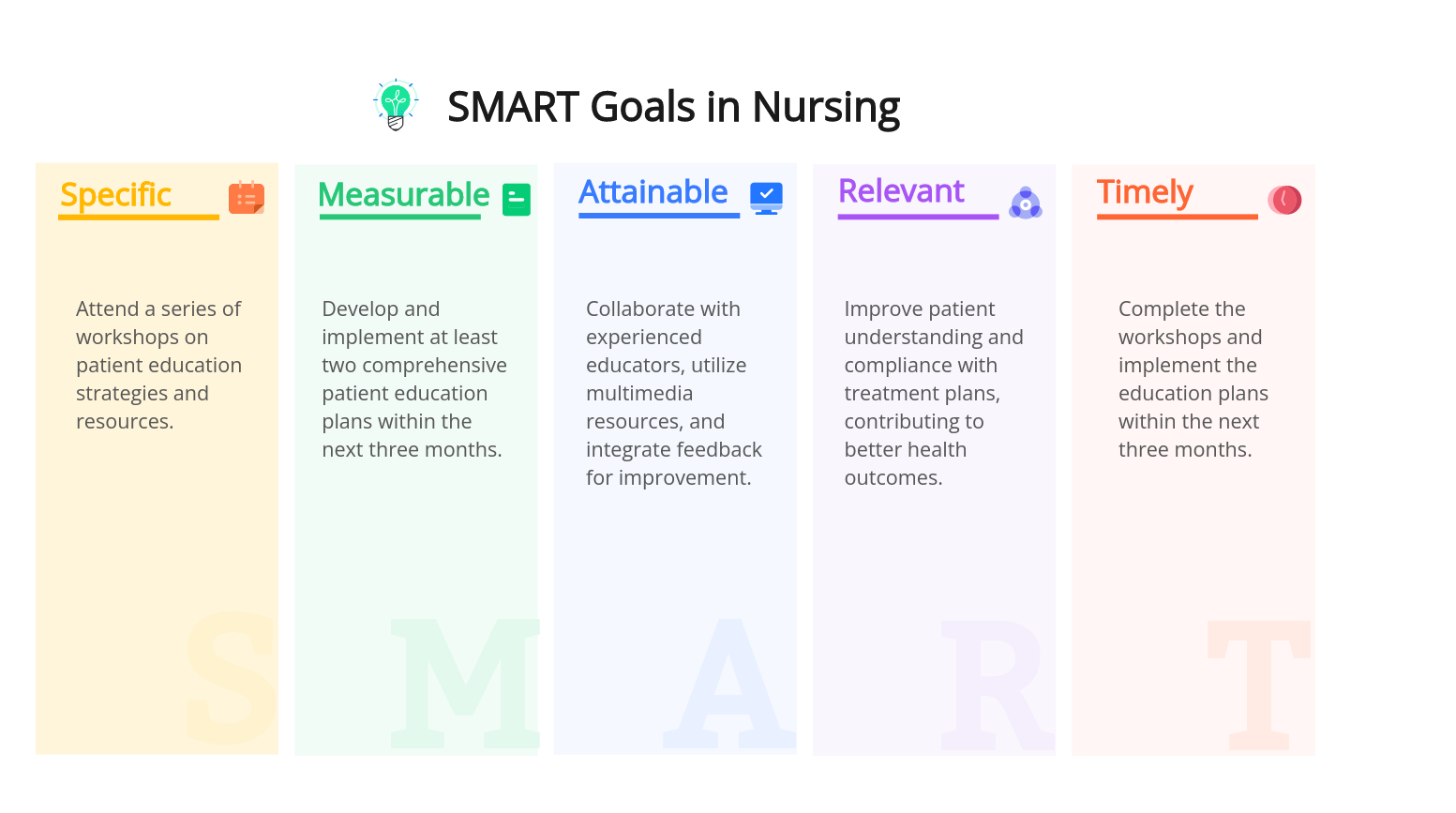
SMART goals can revolutionize nursing practice by providing clear direction and measurable outcomes. Here's how they can impact your professional life:
Enhanced Focus: By setting specific goals, you can concentrate your efforts on what truly matters, avoiding distractions and optimizing your time.
Improved Performance: Measurable goals help track progress, making it easier to identify areas for improvement and celebrate achievements.
Increased Motivation: Achievable goals keep you motivated by providing attainable challenges that stimulate professional growth.
Career Advancement: Relevant goals ensure that your efforts contribute to your long-term career aspirations, helping you advance in your field.
Better Time Management: Time-bound goals encourage efficient use of time, preventing procrastination and ensuring timely completion of tasks.
How Can SMART Goals for Nurses Enhance Professional Development?
Continuous Learning: SMART goals encourage ongoing education and skill development, essential for keeping up with advancements in the healthcare industry.
Skill Enhancement: By focusing on specific areas for improvement, SMART goals help you develop critical nursing skills that enhance patient care.
Career Path Clarity: Relevant and specific goals align with your career objectives, providing a clear pathway for advancement.
Performance Improvement: Regularly setting and achieving SMART goals leads to consistent performance improvements, making you a more effective and reliable nurse.
Increased Confidence: Achieving well-defined goals boosts self-confidence, empowering you to take on more significant challenges and responsibilities.
Examples of Conducting Nursing SMART Goals with Boardmix
Boardmix is a powerful tool for creating and tracking SMART goals. Here’s how you can use it to set and achieve your nursing goals:
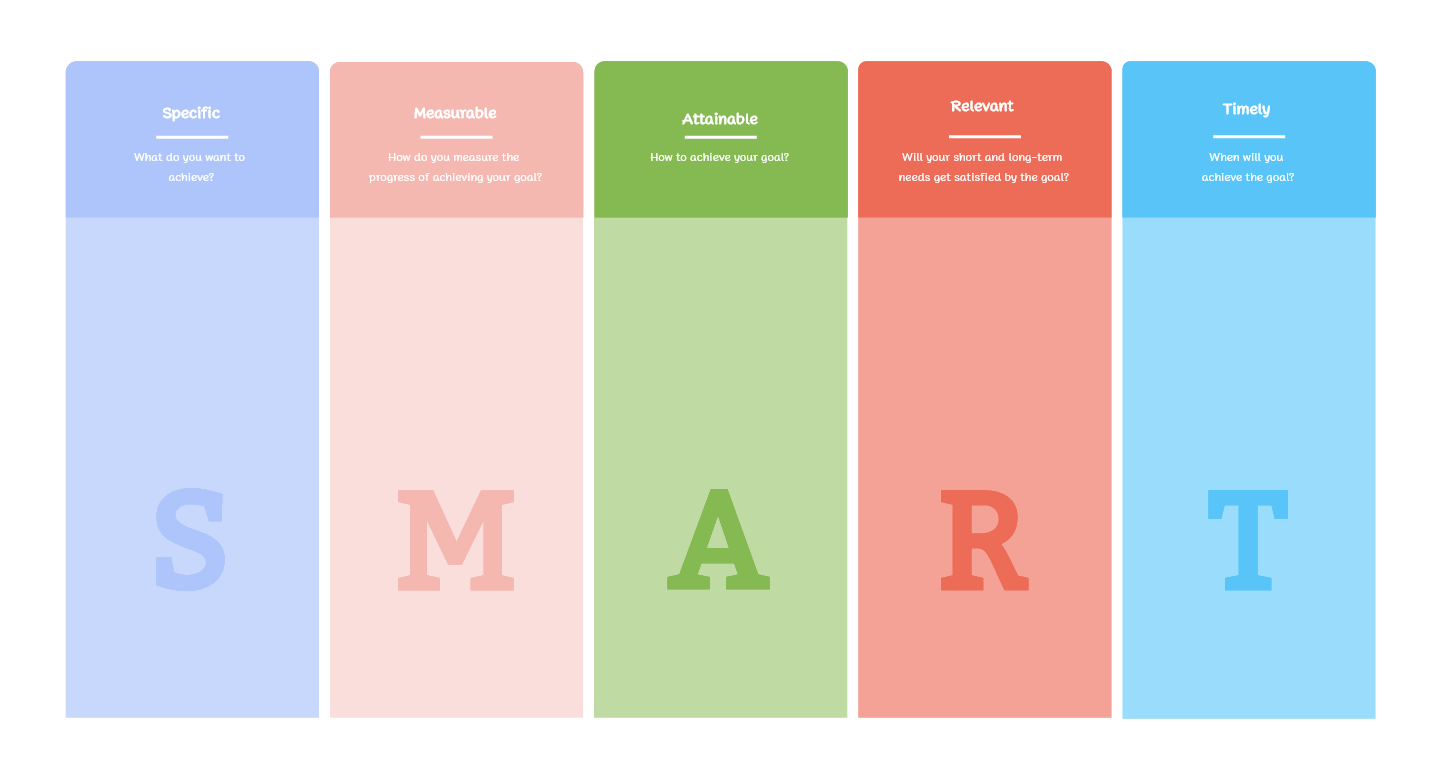
Step-by-Step Process:
Identify Goal Areas: Determine the areas where you want to set goals, such as patient care, education, or leadership.
Create SMART Goals: Use Boardmix’s templates to outline specific, measurable, achievable, relevant, and time-bound goals. You can find the SMART template you need in Boardmix's template library and adapt it to your needs using the diverse design tools Boardmix offers.
Track Progress: Utilize Boardmix’s tracking features to monitor your progress and make adjustments as needed.
Review and Reflect: Regularly review your goals on Boardmix to assess your progress and reflect on your achievements.
Examples of SMART Goals for New Nurses
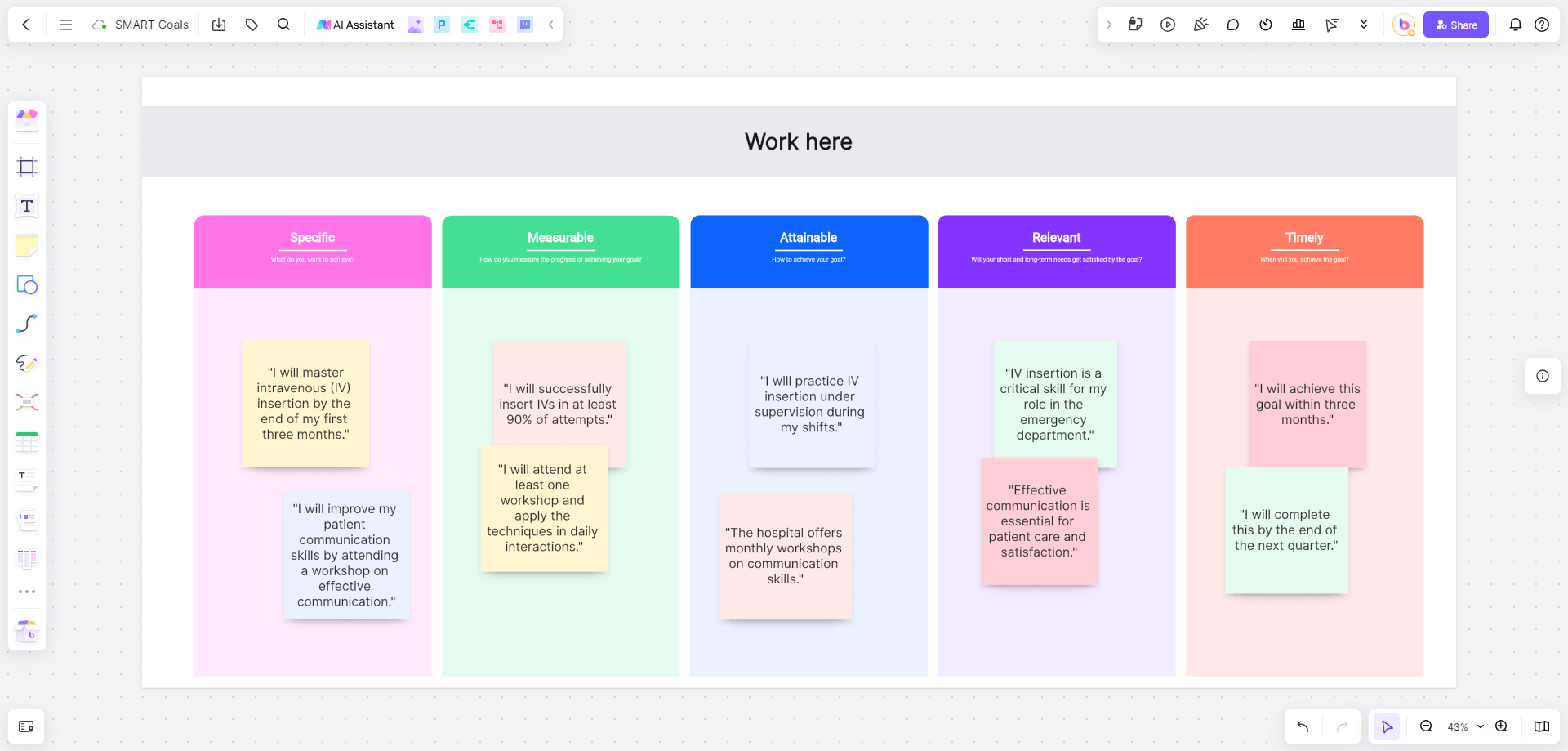
For new nurses, setting SMART goals can help transition smoothly into the profession and build foundational skills.
Clinical Skills:
Specific: "I will master intravenous (IV) insertion by the end of my first three months."
Measurable: "I will successfully insert IVs in at least 90% of attempts."
Achievable: "I will practice IV insertion under supervision during my shifts."
Relevant: "IV insertion is a critical skill for my role in the emergency department."
Time-bound: "I will achieve this goal within three months."
Patient Interaction:
Specific: "I will improve my patient communication skills by attending a workshop on effective communication."
Measurable: "I will attend at least one workshop and apply the techniques in daily interactions."
Achievable: "The hospital offers monthly workshops on communication skills."
Relevant: "Effective communication is essential for patient care and satisfaction."
Time-bound: "I will complete this by the end of the next quarter."
Examples of SMART Goals for Experienced Nurses
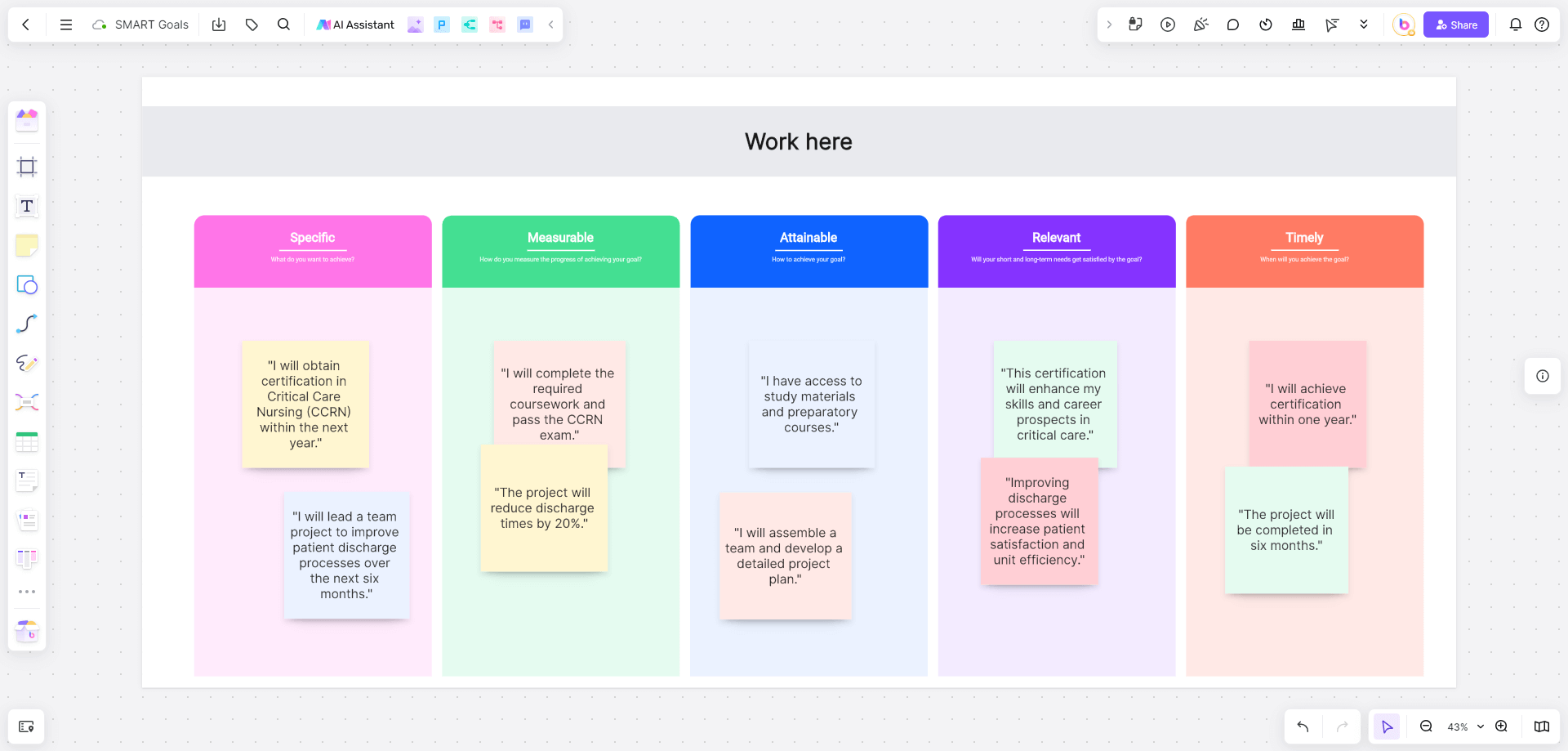
Experienced nurses can use SMART goals to further develop their expertise and take on leadership roles. Here are some nursing smart goals examples:
Advanced Certifications:
Specific: "I will obtain certification in Critical Care Nursing (CCRN) within the next year."
Measurable: "I will complete the required coursework and pass the CCRN exam."
Achievable: "I have access to study materials and preparatory courses."
Relevant: "This certification will enhance my skills and career prospects in critical care."
Time-bound: "I will achieve certification within one year."
Leadership Skills:
Specific: "I will lead a team project to improve patient discharge processes over the next six months."
Measurable: "The project will reduce discharge times by 20%."
Achievable: "I will assemble a team and develop a detailed project plan."
Relevant: "Improving discharge processes will increase patient satisfaction and unit efficiency."
Time-bound: "The project will be completed in six months."
Examples of SMART Goals for Nursing Students
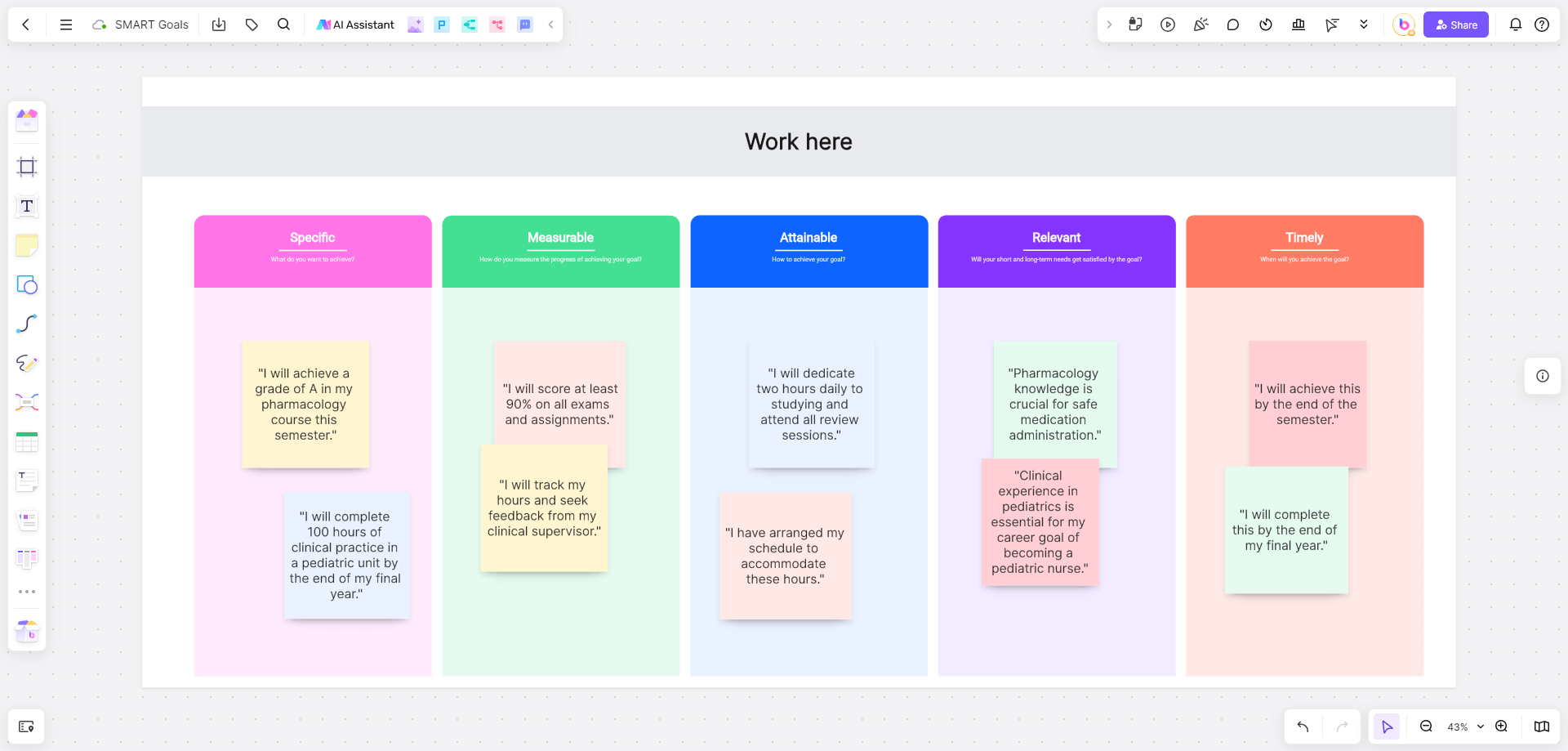
Nursing students can benefit from setting SMART goals to excel academically and prepare for their careers. Here are some nursing smart goals examples:
Academic Performance:
Specific: "I will achieve a grade of A in my pharmacology course this semester."
Measurable: "I will score at least 90% on all exams and assignments."
Achievable: "I will dedicate two hours daily to studying and attend all review sessions."
Relevant: "Pharmacology knowledge is crucial for safe medication administration."
Time-bound: "I will achieve this by the end of the semester."
Clinical Experience:
Specific: "I will complete 100 hours of clinical practice in a pediatric unit by the end of my final year."
Measurable: "I will track my hours and seek feedback from my clinical supervisor."
Achievable: "I have arranged my schedule to accommodate these hours."
Relevant: "Clinical experience in pediatrics is essential for my career goal of becoming a pediatric nurse."
Time-bound: "I will complete this by the end of my final year."
Implementing SMART Goals in Nursing Practice
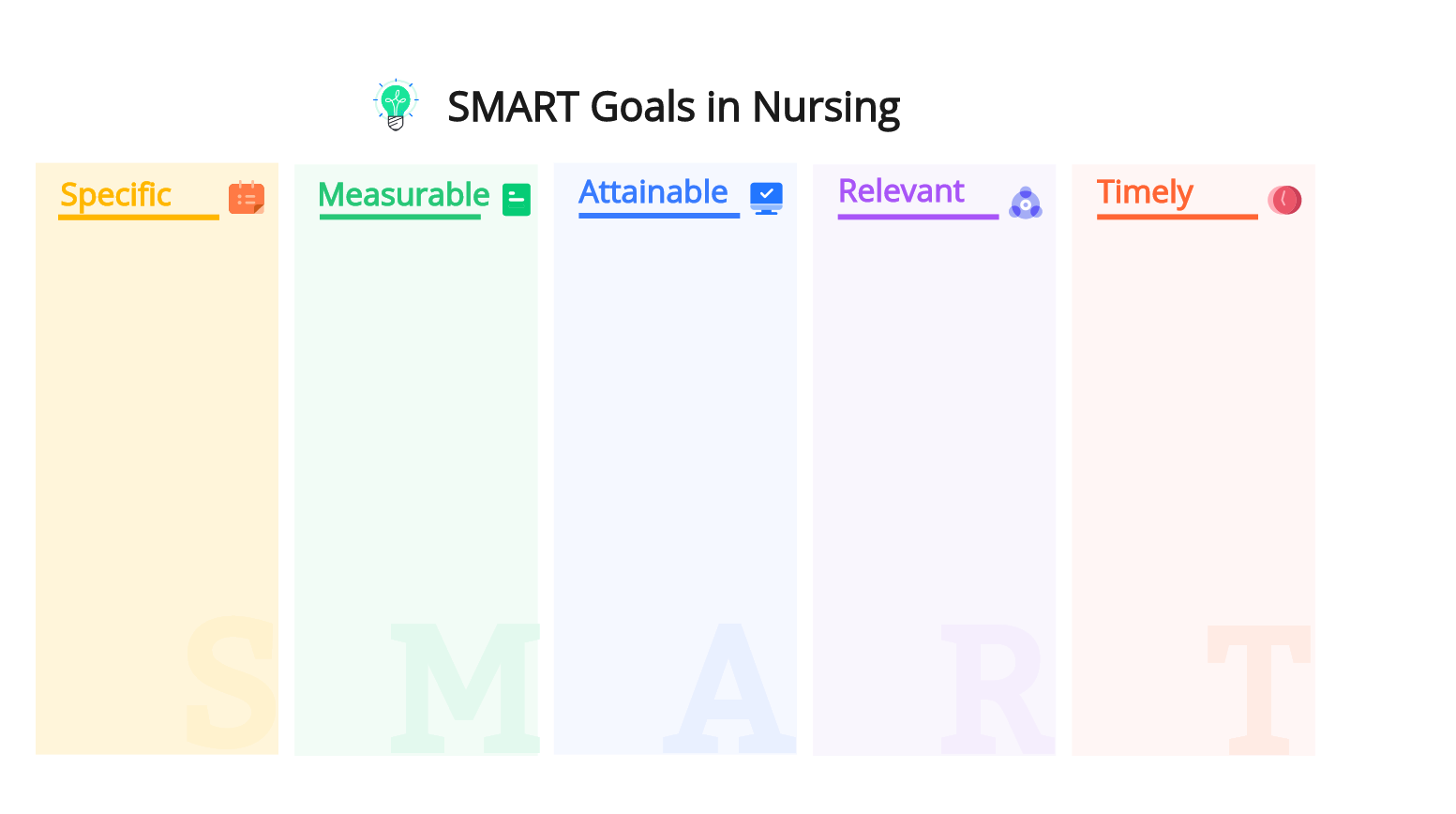
Implementing SMART goals in nursing practice involves several steps to ensure they are effectively integrated into daily routines:
Identify Areas for Improvement: Assess your current skills and identify areas that need enhancement.
Set Clear Goals: Use the SMART criteria to set specific, measurable, achievable, relevant, and time-bound goals.
Create an Action Plan: Develop a detailed plan outlining the steps needed to achieve your goals.
Monitor Progress: Regularly track your progress and make necessary adjustments to stay on track.
Seek Support: Engage with mentors, colleagues, and supervisors for guidance and feedback.
Reflect and Adjust: Periodically review your goals to assess their relevance and make adjustments as needed.
How to Overcome Challenges in Setting and Achieving Nursing SMART Goals?
Lack of Clarity:
Solution: Ensure your goals are specific and clearly defined. Break them down into smaller, manageable tasks.
Limited Resources:
Solution: Identify available resources and seek additional support from supervisors or colleagues.
Time Constraints:
Solution: Prioritize your goals and manage your time effectively. Use scheduling tools to allocate dedicated time for goal-related activities.
Resistance to Change:
Solution: Embrace a growth mindset and be open to new approaches. Seek feedback and be willing to adapt.
Lack of Motivation:
Solution: Set achievable milestones and celebrate small successes. Stay connected with peers for encouragement and accountability.
Tracking Difficulties:
Solution: Use tools like Boardmix to monitor progress and make data-driven decisions.
By understanding and addressing these challenges, you can stay focused on achieving your nursing SMART goals and enhance your professional development.
Conclusion
Setting and achieving SMART goals is essential for nursing professionals at all stages of their careers. By using the SMART criteria, you can create clear, actionable, and attainable goals that significantly enhance your skills, performance, and career prospects. Whether you are a new nurse, an experienced practitioner, or a nursing student, integrating nursing SMART goals examples into your practice will help you achieve continuous growth and success. Embrace the power of SMART goals with Boardmix and take proactive steps towards realizing your professional aspirations!




